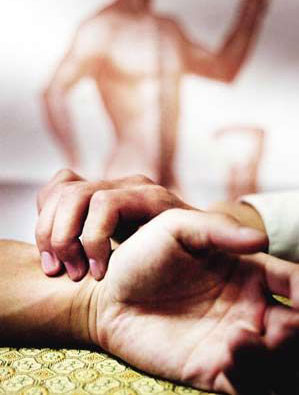Though some TCM hospitals are equipped with modern examination machines, experienced TCM doctors still rely on four basic diagnostic tests in their treatment of common illnesses, writes Zhang Qian.
Without X-ray photography or stethoscope, traditional Chinese medicine developed four diagnostics through long practice, namely, inspection, auscultation and olfaction, inquiring, and palpation and pulse-feeling.
TCM believes in a close relation between the outside of the human body and the organs inside. The changes of vital energy, blood, yin and yang of the organs usually reflect on the body surface.
Inspection is observing the changes on the relevant regions of the sufferers' body and the changes of excretion of them to understand the state of pathological changes.
Vitality and mental state, skin color, physical condition and the tongue are the most frequently inspected regions that tell one's health condition. For example, the color of a healthy person's tongue is light red, indicating his or her vital energy is strong and the organs and blood circulation are healthy. Changes in the tongue color usually reflect chronic illness.
Auscultation and olfaction usually include two aspects - auscultation of voice and olfaction of odor which includes hearing the changes in sounds of speech and breath of sufferers and smelling the changes of odor of the mouth and the odor of excretions.
Inquiring is asking the sufferer and his or her companion questions about the symptoms the sufferer feels, present medical history, past medical history and other related matters. Perspiration, defecation, urination, taste for food, and condition of sleep are all frequently asked by a TCM doctor in diagnosis.
Palpation and pulse-feeling are also essential in TCM diagnosis. Palpating the chest, abdomen, hands, feet, skin and other regions can help the doctor know about the condition of an organ by touching it across the skin; while feeling the suffer's pulse can help the doctor determine the condition of vital energy and blood, organism, and organs.
Though some TCM hospitals nowadays are equipped with modern examination machines like X-rays or CT to help determine certain diseases, the four diagnostics are still the main methods for experienced TCM doctors in diagnosing common illnesses.
As most TCM diagnostics are based on the signs shown at the outside body, the result may be easily influenced by some "fake" appearance. For example, make-up may deceive even the most experienced doctor as it changes the signals of illness shown on your face.
(Shanghai Daily September 25, 2007)


